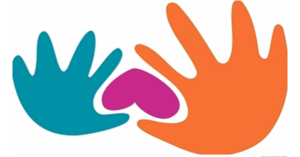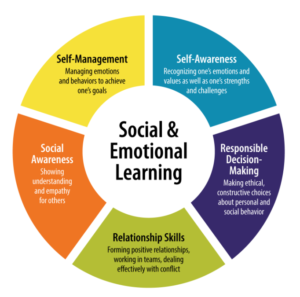 The Social, Emotional, and Ethical (SEE) Learning programme is an educational curriculum for kindergarten right through to age 18 (K-12), envisioned and developed together by researchers at Emory University in Atlanta, Georgia and the Office of His Holiness the Dalai Lama (OHHDL). Since 1998 Emory University has had an Emory-Tibet partnership[6] through which Western and Tibetan Buddhist intellectual traditions have converged. The SEE Learning programme is part of Emory University’s Centre for Contemplative Science and Compassion-Based Ethics[5]. It was developed to empower children with the emotional and interpersonal skills needed to navigate the complexities of daily life and better manage their own emotions.
The Social, Emotional, and Ethical (SEE) Learning programme is an educational curriculum for kindergarten right through to age 18 (K-12), envisioned and developed together by researchers at Emory University in Atlanta, Georgia and the Office of His Holiness the Dalai Lama (OHHDL). Since 1998 Emory University has had an Emory-Tibet partnership[6] through which Western and Tibetan Buddhist intellectual traditions have converged. The SEE Learning programme is part of Emory University’s Centre for Contemplative Science and Compassion-Based Ethics[5]. It was developed to empower children with the emotional and interpersonal skills needed to navigate the complexities of daily life and better manage their own emotions.
Foundational to this programme is the framework of Social Emotional Learning (SEL). In 2015 the United Nations General Assembly put forth a collection of 17 Sustainable Development Goals [1] as a model for bringing our global community into a more sustainable, harmonious state. Goals which include Affordable and Clean Energy, Zero Hunger and Reducing Inequality, and meant to be achieved by the year 2030. In a 2019 UNESCO-MGIEP publication[2], the UN outlined how Social Emotional Learning is needed to achieve our Sustainable Development Goals. So, what exactly is Social Emotional Learning and how can it help us as a global society?
 During the 1990’s Peter Salovey and John D Mayer had coined the term “Emotional Intelligence” to describe capability in the awareness and navigability of one’s emotional landscape. This term came further into prominence after the publication of Daniel Goleman’s Emotional Intelligence: Why It Can Matter More Than IQ. Social Emotional learning emerged from this concept of developing one’s emotional intelligence alongside intellectual intelligence. Traditional western school curriculums largely favour the development of logic and reasoning over the development of our social and emotional skills. SEL aims at developing an individual’s capacity to deal with emotions and interpersonal relations in a more constructive and empathic manner. SEL cultivates the five learning competencies of social awareness, self-management, self-awareness, relationship skills and responsible decision-making. Through this framework, the learner becomes more emotionally resilient and skillful in regulating emotional response[2]. Later developments in SEL programmes have highlighted the importance of mindfulness being introduced as a self-regulatory and self-awareness technique. Although SEL programmes such as SEE Learning are predominately targeted towards child development and K-12, these are lifelong skills useful to both adults and children. Research over the past 10 years has shown how SEL helps prevent bullying, improves academic outcomes and reduces the occurrence of mental health problems in schools 3. It is however important to state that the ideology of Social Emotional Learning aims to strike a balance between emotional and intellectual intelligence, rather than favour one over the other. But we can clearly see the absence of emotional learning or emotional regulatory learning objectives in most K-12 curriculums.
During the 1990’s Peter Salovey and John D Mayer had coined the term “Emotional Intelligence” to describe capability in the awareness and navigability of one’s emotional landscape. This term came further into prominence after the publication of Daniel Goleman’s Emotional Intelligence: Why It Can Matter More Than IQ. Social Emotional learning emerged from this concept of developing one’s emotional intelligence alongside intellectual intelligence. Traditional western school curriculums largely favour the development of logic and reasoning over the development of our social and emotional skills. SEL aims at developing an individual’s capacity to deal with emotions and interpersonal relations in a more constructive and empathic manner. SEL cultivates the five learning competencies of social awareness, self-management, self-awareness, relationship skills and responsible decision-making. Through this framework, the learner becomes more emotionally resilient and skillful in regulating emotional response[2]. Later developments in SEL programmes have highlighted the importance of mindfulness being introduced as a self-regulatory and self-awareness technique. Although SEL programmes such as SEE Learning are predominately targeted towards child development and K-12, these are lifelong skills useful to both adults and children. Research over the past 10 years has shown how SEL helps prevent bullying, improves academic outcomes and reduces the occurrence of mental health problems in schools 3. It is however important to state that the ideology of Social Emotional Learning aims to strike a balance between emotional and intellectual intelligence, rather than favour one over the other. But we can clearly see the absence of emotional learning or emotional regulatory learning objectives in most K-12 curriculums.
There is a substantial ripple effect to be observed if an increasing number of individuals worldwide enjoy an elevated mental wellbeing, while more frequently engaging in prosocial behaviour. To navigate the uneasiness felt by an unsavoury emotional state, it requires one to have the capacity for emotional resilience[2]. Building more emotionally stable and empathetic individuals will have lasting global impact by having the potential to reduce poverty, reduce the income inequality gap and improve economic mobility[4]. There is a wealth of evidence that points towards a correlation in prosocial behaviour and making our Sustainable Development goals more achievable. We will need more socially constructive and emotionally resilient individuals to help manage our pending global challenges. With the handling of a worldwide pandemic and the demanding mitigations of climate change at our doorstep, each day it becomes more important that we become more skillful, proactive and empathic global citizens.
References:
[1] About the Sustainable Development Goals – United Nations Sustainable Development. (n.d.). Retrieved from www.un.org/sustainabledevelopment/sustainable-development-goals/
[2] Asah, S. T., & Singh, N. C. S. i C. (2019). SEL for SDGs: Why Social and Emotional Learning (SEL) is necessary to achieve the Sustainable Development Goals (SDGs). The Blue DOT, (10), 54–60.
[3] Durlak, J. A., Weissberg, R. P., Dymnicki, A. B., Taylor, R. D., & Schellinger, K. B. (2011). The Impact of Enhancing Students’ Social and Emotional Learning: A Meta-Analysis of School-Based Universal Interventions. Child Development, 82(1), 405–432. doi: 10.1111/j.1467-8624.2010.01564.x
[4] Mead, L. (2015). Policy Report: Opportunity, Responsibility, and Security: A Consensus Plan for Reducing Poverty and Restoring the American Dream. Washington, DC: American Enterprise Institute and Brookings Institution.
[5] “Center for Contemplative Science and Compassion-Based Ethics: Emory University: Atlanta GA.” CBCT® | CSSCBE – Emory University, www.compassion.emory.edu/.
[6] “ROBERT A. PAUL EMORY-TIBET SCIENCE INITIATIVE (ETSI).” The Emory-Tibet Science Initiative (ETSI) – Program Overview, tibet.emory.edu/program-overview.html.
*** Building on Lha’s Secular Ethics Fellowship earlier this year, we have commissioned a series of articles looking at different aspects of Secular Ethics, leading up to a research project next spring which will look at the education aspects in more depth and at what is happening in the schools in Dharamshala. Look out for our follow up articles in the coming months by Okechukwu, our volunteer who’s interest in Secular Ethics has led to his offer to look at how it is being received in various locations, and how the students and educators feel about its inclusion in the curriculum. Find the articles on our Secular Ethics page.




 Print
Print Email
Email